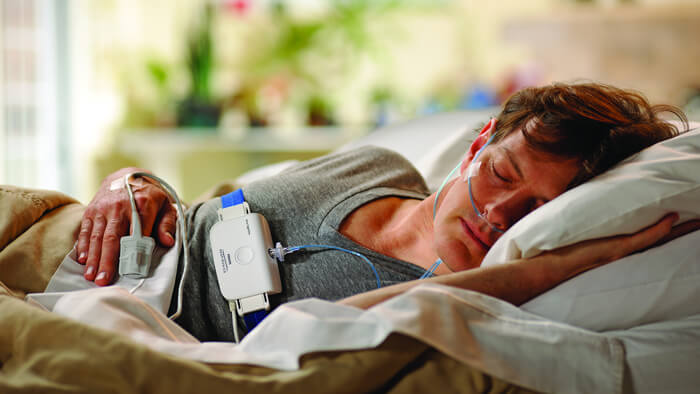What is sleep apnea?
Sleep apnea is a common sleep disorder characterized by repeated interruptions in breathing throughout the sleep cycle.
These interruptions, called apneas, are caused by the collapse of soft tissue in the airway,
which prevents oxygen from reaching the lungs.
Sleep apnea disrupts the sleep cycle and can dramatically impact energy, mental performance, and long-term health — but there are effective treatments available to counteract these symptoms1.
Discover how sleep apnea might affect you.
Start our quiz to find out more with 10 simple questions.

80% of sleep apnea
goes undiagnosed*
goes undiagnosed*
What are the risks of untreated sleep apnea?2
Sleep apnea can have serious short and long-term health risks if left untreated including:






What are the symptoms of sleep apnea?
You should familiarize yourself with sleep apnea and its risks and discuss your symptoms with your primary care doctor. A sleep study, which can be performed at home, could also help with a diagnosis.
Sleep apnea symptoms can include2:

Nighttime

Daytime
Think you have sleep apnea?


Step 1
Take our symptoms quiz
Undiagnosed sleep apnea can have serious consequences, if left untreated. Check to see if you're at risk.


Talk to your doctor
If you believe you may be at risk of sleep apnea, you should speak to a doctor about your symptoms.


Step 3
Sleep test
A sleep apnea diagnosis is confirmed with a sleep test in a sleep lab or in your home, depending on your health history and your insurance.


Diagnosis
Your doctor will discuss your clinical sleep test results with you.


Step 5
Treatment
Been diagnosed with sleep apnea?
Your doctor will discuss your sleep solution options with you.
Discover how sleep apnea might affect you
Start our quiz to find out more with 10 simple questions
Learn more about
sleep apnea diagnosis
and treatment
Find out if you could be at risk for sleep apnea
Learn more about sleep apnea
diagnosis and treatment
diagnosis and treatment
* Finkel, Kevin J. et al, Prevalence of undiagnosed obstructive sleep apnea among adult surgical patients in an academic medical center, Sleep Medicine, 10 (2009) 753-758
1. https://www.nhlbi.nih.gov/health/sleep-apnea
2. https://www.sleepapnea.org/obstructive-sleep-apnea/







